Benefits of Trading Forex
Trading the Forex market has several advantages over other financial markets. Amongst the most important are: liquidity, it’s a 24hr market, leverage trading (margin), low transaction costs, low minimum investment, specialized trading, you can trade from anywhere and others.
Liquidity
Forex market is by far the most liquid financial market in the world with nearly 2 trillion dollars traded every day according to the Bank of International Settlements.
Why is the liquidity so important to us? Because it helps us in several ways:
The most important of all is that superior liquidity ensures price stability. With such a big market, there will be always someone willing to buy or sell any currency at the quoted price, making it easy to open and close trades or transactions at any time of the day. However, there are periods of high volatility during which it might be not easy to get a good fill.
Because of the great amount of liquidity, most of the time we are able to get in and out the market fast with consistent executions. But as any other market, during periods of instability slippage is always a possibility.
Higher liquidity also makes it hard to manipulate the market in an extended manner. If some of its participants try to manipulate it, the participants would require enormous amounts of money (tens of billions) making it practically impossible.
Volume Generated by Country
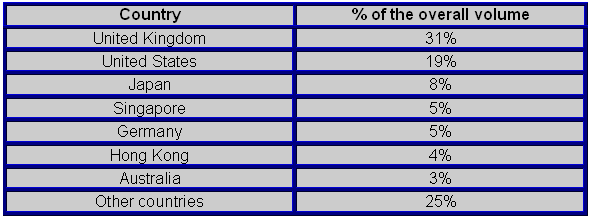
[Table 1]
Source: Bank of International Settlements (BIS) 2006 Survey
In the table above we see that the UK and US account for around 50% of the total turnover, and as a rule of thumb, the more liquidity the more the market moves. We will talk about this later on.
24hr Market
The Forex market is an around the clock market. This means that you could open or close any position at any time from Sunday 5:00 pm EST (Eastern Standard Time) when New Zealand begins operations to Friday 5:00 pm EST, when San Francisco terminates operations. The main reason for this is that there is no physical location where all transactions take place (OTC).
Most Important Session Time Zones
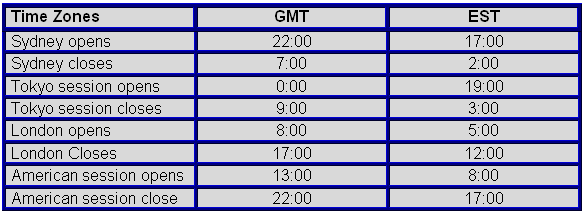
[Table 2]
Here you have a more comprehensible table:
Session Time Zones Table
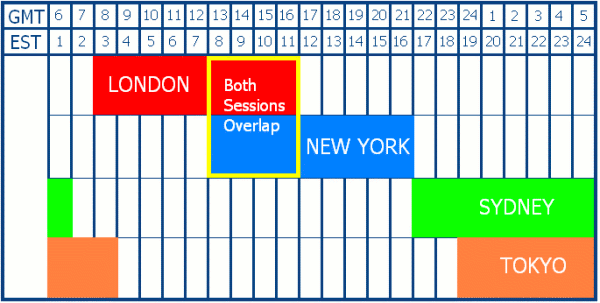
[Image 1]
Brain Feeder 2
As you can see in the image above, there are 4 hours in which the London and the New York sessions overlap, what could this mean in terms of volume and liquidity?
In case you are looking for a map zone, we created this for you:
World Map Zone
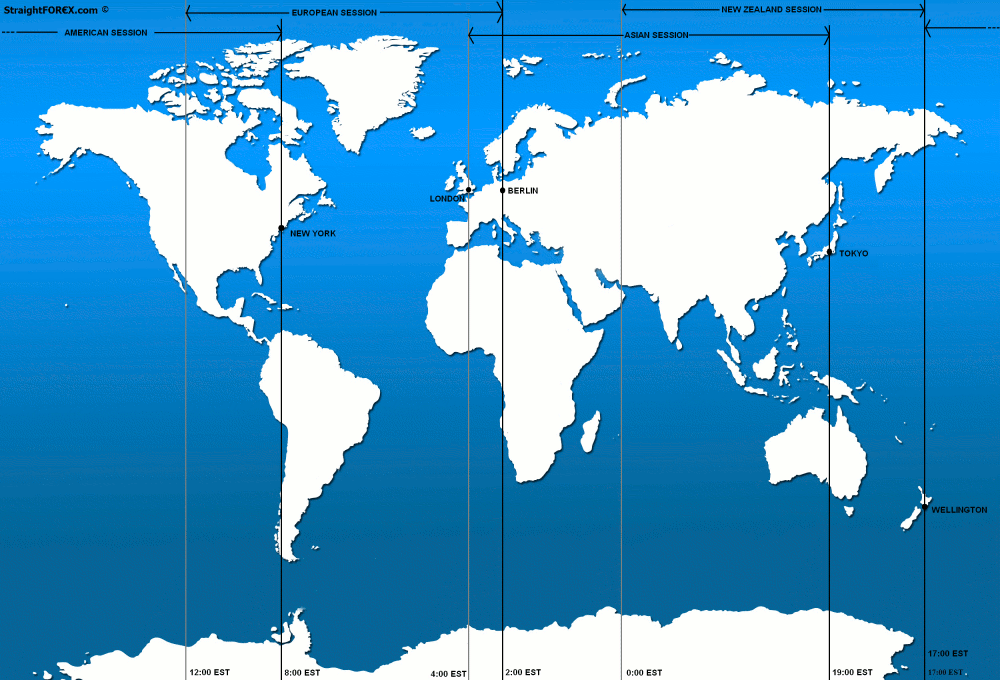
[Image 2]
Leveraged Trading
Forex trading gives much more buying/selling power than many other financial markets. This allows us to control greater transactions with a small margin deposit. Some brokers offer up to 400:1 leverage, meaning that you can control for instance a 100,000 US dollar transaction with just .25% or US$250. This also allows us to keep our risk capital at the minimum.
However, beware as this is a double-edged sword. If the leverage is not properly used, this could also be a disadvantage. The more leverage you use, the more of your account is at risk.
Imagine this scenario: Two traders with the same capital using different leverage:
Trader A: using 400:1 with a US$2,000 trading account
Trader B: using 100:1 with a US$2,000 trading account
If both of them open a standard trade (100,000 units) trader A will have at risk US$1,750 (2,000 – 250 = 1750) while trader B will only have at risk US$1,000 (2000 – 1000 = 1000)*.
*Of course there are risk management techniques that allow traders to reduce that amount of risk such as stop loss orders. We will go deeper in to this in the following lesson…
For this reason, using leverage greater than 50:1 is not advised.
Remember: the margin is used as a deposit; everything else is also at risk.
Low Transaction costs
The Forex market is considered one of the markets with the lowest costs of trading. Most brokers collect their fees based on two schemes:
Spread – Brokers collect their fees by charging a different price for long and short positions. The difference is what is collected by the broker.
Spread and Commissions – Most brokers under this scheme charge a commission but usually the spread is tighter and transaction costs can even fall below brokers under the spread “only” scheme.
Low minimum investment
The Forex market requires less capital to start trading than any other markets. Some brokers allow traders to open trading accounts with an investment that could go as low as US$1 (yes, you read that right, that is one US dollar.) On average however, brokers allow traders to open accounts with around US$250.
Of course, you can’t expect to make a fortune with that investment but it will get your feet wet before you start risking a larger amount of capital or you can try to slowly start growing your account from there.
Specialized trading
The liquidity of the market allows us to focus on just a few instruments (or currency pairs) as our main investments (85% of all trading transactions are made on the previously mentioned seven major currencies). This allows us to keep track of, monitor and get to know each instrument better.
Trading from anywhere
Not having a physical location where all transactions take place (OTC), allows us to trade from anywhere in the world. We only need either a phone line (where you can have direct access to the brokers dealing desk) or an internet connection (through an online platform).
Below, comparative tables between the Forex market and other financial markets.
Forex vs. Equities
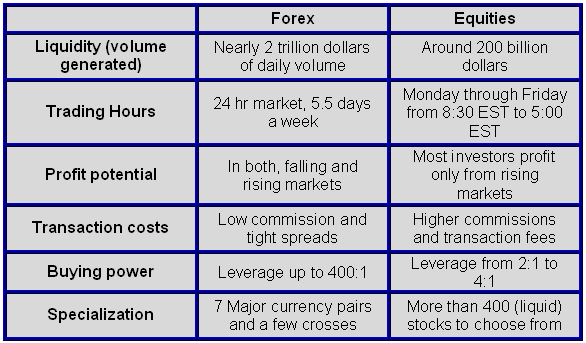
[Table 3]
Forex vs. Futures
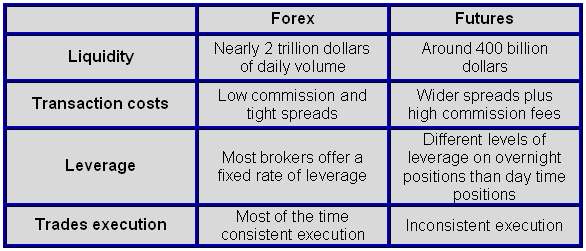
[Table 4]